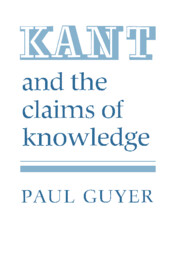Book contents
- Frontmatter
- Contents
- Acknowledgments
- Note on sources
- Introduction
- Part I Kant's early view
- Part II The transcendental deduction from 1781 to 1787
- 3 The real premises of the deduction
- 4 The deduction from knowledge of objects
- 5 The deduction and apperception
- Part III The principles of empirical knowledge
- Part IV The refutation of idealism
- Part V Transcendental idealism
- Afterword
- Notes
- Index of passages cited
- General index
4 - The deduction from knowledge of objects
Published online by Cambridge University Press: 09 March 2010
- Frontmatter
- Contents
- Acknowledgments
- Note on sources
- Introduction
- Part I Kant's early view
- Part II The transcendental deduction from 1781 to 1787
- 3 The real premises of the deduction
- 4 The deduction from knowledge of objects
- 5 The deduction and apperception
- Part III The principles of empirical knowledge
- Part IV The refutation of idealism
- Part V Transcendental idealism
- Afterword
- Notes
- Index of passages cited
- General index
Summary
In this chapter, we shall consider versions of the deduction which assume (I) the possibility of knowledge of objects from the outset and which attempt to show only that such knowledge presupposes a priori knowledge of the categories – arguments, if you will, targeted at empiricists but not at skeptics. Such arguments can initially be divided into those (A) which assume some claim to synthetic a priori knowledge from the outset and those (B) which ostensibly do not – although we shall also see that Kant's actual execution of strategy IB involves an early and fallacious introduction of a necessarily true premise.
Among the three styles of argument that we shall examine under the rubric IA, only one follows the model of the transcendental exposition of space (B 40–1) by postulating a specific body of synthetic a priori knowledge (indeed, the same body of knowledge, that is, geometry) which can be shown to have further a priori conditions (although, in this case, pure concepts rather than pure intuitions). But in the other two types of argument to be considered under this rubric – namely, Kant's deductions of the categories from the concept of judgment (IA.ii) and from the very concept of an object itself (IA.iii) – the assumption that judgment or knowledge of objects is universal and necessary and therefore involves an a priori element is so quickly introduced that it seems best to regard these as arguments in which Kant explicitly assumes that even empirical knowledge has a synthetic a priori component which can be furnished only by the categories.
- Type
- Chapter
- Information
- Kant and the Claims of Knowledge , pp. 91 - 130Publisher: Cambridge University PressPrint publication year: 1987



